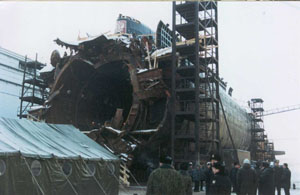
Bellona Launches Oslofjord Kelp Park
Bellona has launched the Oslofjord Kelp Park, a pilot kelp cultivation facility outside Slemmestad, about 30 kilometers southwest of Oslo, aimed at r...
News

Publish date: March 3, 2003
Written by: Igor Kudrik
News
The Kursk submarine is defuelled. The last fuel assembly was removed from the submarine’s aft reactor on February 17th 2003. The remnants of the submarine will be dismantled, and the reactor section will be separated and towed to Sayda Bay at the Kola Peninsula — the storage site that currently holds more than 50 reactor compartments, afloat at pier points.
The Kursk story seems to stop unfolding here.
"It sank," Russia’s President Vladimir Putin said.
"It sank as a result of torpedo explosion," Vladimir Ustinov, the Prosecutor General of the Russian Federation, said, detailing to some extent the answer of his president, when finalising the result of the official investigation in July 2002.
On August 12th 2000, Russia’s Oscar-II class submarine, the Kursk, sank in the Barents Sea, hit the seabed and lost all 118 hands onboard.
The accident happened during the last day of Northern Fleet’s military training, which had started two days before, on August 10th.
At 11:28:26.5 Moscow time an explosion, or rather a seismic event, was detected onboard surface vessels of the Northern Fleet which took part in the exercise and onboard an American submarine, spying on the training exercise. At 11:30 and 44.5 seconds the Northern Fleet’s surface ships detected the second ‘seismic event’, which was much more powerful than the first.
The second explosion, or rather a chain of minor consecutive explosions, completely devastated the bow section of the submarine, including the first, second and the third compartments. It also damaged the forth, fifth and the fifth-extra compartments, killing everyone in there in a matter of seconds. The explosion stopped at the bulkhead separating the sixth compartment — the reactors’ compartment. The submarine then hit the seabed at the depth of 110 to 112 metres.
The Kursk was raised by the Dutch company "Mammoet" in autumn 2001 and transported to a military shipyard No 82 in Roslyakovo, a settlement between Murmansk and Severomorsk, the headquarters of the Northern Fleet. Investigation teams worked on the submarine for almost half a year. In April 2002, the submarine was shipped in floating dock Pallada to Nerpa shipyard — situated north of Murmansk at the Kola Peninsula — to empty submarine’s reactors of nuclear fuel.
Due to the powered explosions that shook the submarine Bellona feared that defuelling the reactors would be a dangerous undertaking. This was the first time the Navy’s history when a nuclear submarine which suffered a sever accident and spent more than a year at the depth of around 100 metres was to be defuelled. More over, Nerpa shipyard had never defuelled a cruise missile submarine.
Remnants of Kursk to join the graveyardThe fuel will be put on a train at Atomflot and will be sent to the Mayak reprocessing plant — considered to be the most radioactively contaminated place on earth due to both severe past accidents and regular, presently occurring discharges to the environment. Mayak’s reprocessing facilities are now officially closed. The Russian Nuclear Regulatory, GAN, revoked its license because of intensive discharges. But officials at Mayak are adamant that the reprocessing ban will be shortly lifted and will proudly treat the fuel from Kursk, dumping the waste in the nearby lake…

Bellona has launched the Oslofjord Kelp Park, a pilot kelp cultivation facility outside Slemmestad, about 30 kilometers southwest of Oslo, aimed at r...

Our November Nuclear Digest by Bellona’s Environmental Transparency Center is out now. Here’s a quick taste of just three nuclear issues arising in U...

For three years now, Bellona has continued its work in exile from Vilnius, sustaining and expanding its analysis despite war, repression, and the collapse of international cooperation with Russia in the environmental and nuclear fields

The Board of the Bellona Foundation has appointed former Minister of Climate and the Environment Sveinung Rotevatn as Managing Director of Bellona No...